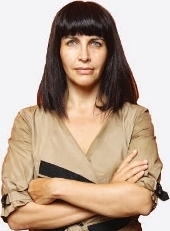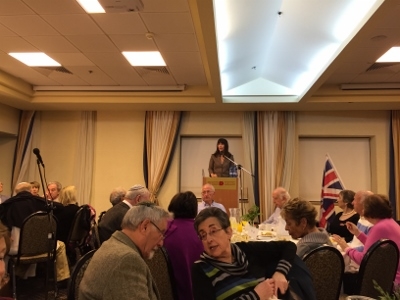The Delegitimization of Israel
Dr. Einat Wilf thinks that the underlying subtext of the upcoming Israeli elections will be about the way the world thinks about Israel. Is the world's present low opinion of Israel about what we do or is it about who we are? "This is another way to think about the division in Israeli politics between the right and the left," she says. "The left, broadly speaking, would argue that what we are seeing now in all of the condemnation is about what Israel does. And therefore, by changing our behavior we would be able to change the reaction of what we are seeing in the world. Whereas the right, broadly speaking, would argue that this is about who we are. And as a result, it matters very little in this context about what we do."
Dr. Wilf shared her thinking recently in a talk, "Dangerous Ideas: Israel and the Battle against Delegitimization," before the Israel, Britain and Commonwealth Association (IBCA) at the Sharon Hotel in Herzliya.
Born in Jerusalem in 1970, Dr. Wilf was educated at the Hebrew University Secondary School. She was an Intelligence Officer in the Israel Defense Forces and reached the rank of lieutenant. She then went to Harvard University, receiving a BA in government and fine arts. She later attended Cambridge University, where she earned a PhD in political science. Dr. Wilf is a Senior Fellow with the Jewish People Policy Institute and an Adjunct Fellow at the Washington Institute for Near East Policy.
Formerly a Labor and later Independence Party Member of Knesset, Dr. Wilf was Chair of the Education, Sports and Culture Committee, Chair of the Knesset Sub-Committee for Israel and the Jewish People, and Member of the Foreign Affairs and Defense Committee in the 18th Knesset. She previously served as Foreign Policy Advisor to Vice Prime Minister Shimon Peres.
By her own accounts, the current onslaught of worldwide hatred against Israel, and the relentless efforts to delegitimize the Jewish state have been something of a transformative experience for her. "I grew up in Jerusalem in a classic Labor Zionist household," she says, "and if there is anything that characterizes this type of Zionism, and Zionism in general, it is that it matters what we do. That we have in our hands the ability to shape our destiny and the way the world views us. I think that in general every person wants to believe that it matters what we do. But in recent years as I go around the world, I've had to question that premise—that it's all about what we do. If we only end the occupation, if we only stop building settlements, the world would treat us differently. The reason I started questioning that assumption is that in many of my talks abroad, where I generally expressed the left-wing Zionist position of two states for two people, I began to sense that when people spoke against Israel, there was such passion, such emotion that I couldn't account for. I sensed a passion, emotion, and hatred that could not be accounted for by people simply disagreeing with Israeli government policies. I had to admit that this was not about what we do. It is very much about who we are."
As to "who we are", Wilf avoids placing emphasis on the obvious root of the problem, but does remark, "I often wonder what Herzl would have thought if he were told that establishing a state for the Jewish people would do nothing to solve anti-Semitism, to solve the Jewish question. He thought he had an analysis of the problem: the Jews are hated because they are homeless among the nations—they do not have the dignity or the freedom of other nations. And as soon as they had a home, with dignity and freedom, they would be able to walk with their heads high among the nations. What would he have thought if he were told that as soon as the Jewish people would have a state, the hatred toward the Jews would merely mutate itself into hatred toward the state, and that nothing fundamentally would change?"
Wilf does say, however, that what she calls the "current tsunami" of sanctions, criticisms from the European Union, anti-Israel resolutions at the UN and the Boycott-Divest-Sanction (BDS) movement are not about settlements, the occupation, or even the recent war in Gaza. "There is the analysis that if Israel merely changes its policies, or simply negotiates in good faith, much of this would disappear. But I believe that there's something far deeper going on. I believe that this is essentially a war waged by different means. Ever since Israel was established, it has had to face warfare: initially by gangs, then by military invasion, then terror, then state-based economic boycott. It took a while, from 1948 to 1973, to get them to realize that they had failed. It took around 25 years to get Arab armies to finally give up on the possibility of getting Israel to surrender by the use of military force. Then it took a few more decades to get terrorism to no longer be considered a primary strategy. The Arab boycott still lives, but by and large we have been able to build a thriving export economy. But every time we pull through, the other side doesn't give up. They just look for other means. And that is what we are seeing right now. This is the same war against Israel and Zionism, but through other means. What are these means? Words, images, ideas, arguments. And this is a real strategic danger."
Wilf has little patience for those who underestimate this threat by failing to see the danger of words used as weapons, and of ideas marshalled to prepare people for evil. She declares, "The world's greatest atrocities, historically, were preceded by preparing people's minds for the belief that what they are about to commit is not an atrocity. People rarely commit crimes thinking they are committing crimes. People rarely think of themselves as evil. Even when people do some of the worst things possible, they have in their minds a mental set that tells them that what they are doing is good." She notes that even the people who have committed what she calls "the world's greatest atrocity", the mass-murder of six million Jews in Europe, had been led to believe that they were ridding the world of evil.
And how are people's minds being prepared for another such atrocity today? Says Wilf, "They are being prepared by what I call the placard strategy. People hold placards—both physically in demonstrations and in things they say on panels, on television, at every opportunity—and the placards say, 'Zionism =', 'Israel='. The placards do not say 'Zionism = the liberation movement of the Jewish people for self-determination in their homeland.' They say that 'Zionism = racism, colonialism, imperialism, apartheid, ethnic cleansing, and now, after last summer, genocide.' These words are chosen not because they reflect reality but because they all have something in common: they are all internationally accepted as evil. There is a broad international consensus that all of these things are evil. So putting them next to 'Zionism', or 'Israel' is basically a way of repeating the message that Zionism and Israel are evil—that Zionism and Israel are the ultimate evil.
"As a citizen of the world, as someone who cares about justice and human rights, your responsibility is to ensure that ultimate evil is erased from the world, by any means possible. It is a non-violent strategy that has been chosen because violent strategies have failed, but the sinister purpose remains the same: the end of Zionism and the destruction of the State of Israel. And people are being prepared that if Israel is somehow made to disappear, not only would that not be a tragedy, but would be desirable. The world would rid itself of a sickness, a disease, of an evil. And that is exactly how minds are being prepared for the carrying out of an atrocity."
Dr. Wilf does not paint this very dark picture without offering a solution which can be expressed in one word: mobilization. "We need to fight head-on this sinister battle that is taking place against Israel and ultimately defeat it," she says. "Our winning in this war would mean the day that those who hold anti-Zionist views would have the legitimacy that neo-Nazis enjoy today. It means to reverse the social acceptability of anti-Zionism that we have today. How? We need to mobilize—people, resources, leadership. We are not yet there. Our military gets 60 billion shekels a year, our Foreign Ministry gets 1.6 billion shekels a year. We still don't understand that this is a war for which we need to mobilize the same way we did for all our other struggles, challenges, and wars.
"When Zionism knew that in order to get a state we needed to gain world legitimacy, we sent our best people to 'the front'. These were people to tell our story and inspire people. Then we sent our best people to the military. I think we need to send some of our best people to the legitimacy front. We need to create what I would call an 'IIDF,' an Intellectual Israel Defense Force. We need to understand that this must be a world-wide effort, and we need to understand that this will take time."
Dr. Wilf's presentation was given under the auspices of the Israel, Britain and Commonwealth Association. Founded shortly after the establishment of the State of Israel in 1948, IBCA's principal objective is "to encourage, develop and extend social, cultural and economic relations between Israel, Britain and the Commonwealth." The Association's meetings, held regularly, areaddressed by prominent politicians, diplomats and academics and are attended by many members of the diplomatic community. This has enabled a dialogue and exchange of views to develop between representatives of Israel and other nations.









Comments